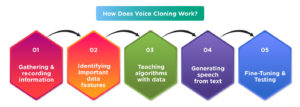The artificial intelligence revolutionary wave shows one of its most exciting developments in AI as voice cloning technology. Computers can now reproduce human voices through systems which handle replication tasks with exceptional accuracy.
The use of voice cloning technology serves various purposes including conversational helper development and deceased voice restoration methods. The technology poses ethical problems because it can be misused. Well, like every other technology that exists, voice cloning also has its fair share of challenges – especially ethical and of course, advantages too!
Here, we will see all about voice cloning, from working process, its present and the future.
What is Voice Cloning?
Voice cloning is a technology that enables AI systems to replicate a person’s voice using deep learning techniques. Unlike traditional text-to-speech (TTS) systems that generate robotic-sounding speech, voice cloning creates natural, human-like voices that mimic tone, pitch, and emotional expressions.
With voice cloning, AI can reproduce a person’s voice with just a few minutes of recorded audio. This technology has applications in entertainment, accessibility, and customer service. However, it also raises concerns regarding deepfake audio and identity fraud.
How Does Voice Cloning Work?
Voice cloning depends on deep learning and natural language processing (NLP) for understanding and duplicating speech patterns. The following explains in detail how voice cloning operates:
1. Gathering and recording information
Acquiring voice samples belonging to the intended speaker constitutes the first essential component of the process. The AI system needs spoken word data which typically extends from short audio files of a few minutes to extensive recordings of hours based on the selected cloning technique.
2. Identifying important data features.
After audio acquisition the system proceeds with identifying essential voice elements including tonal characteristics as well as pitch variations and accent patterns together with speech speed. The selected elements generate a voice clone that sounds more authentic to human speech patterns.
3. Teaching algorithms with data
The deep learning model receives voice features which were extracted from the collected data. GANs alongside Transformer neural networks assist the learning process to replicate the voice patterns of target voices.
4. Generating speech from text
The AI produces artificial speech immediately following training, so it becomes very similar to the original voice. Voice cloning models today have been developed to generate emotions and diversify voice clones which enhances their lifelike quality.
5. Fine-Tuning and Testing
Voice developers conduct multiple tests on the clone until they achieve precise accuracy by refining the parameters for natural speech quality in varied conditions. The method requires time between a few hours to multiple days to finish based on both the model complexity and the voice data quality.
Ethical Challenges of Voice Cloning
The extensive range of advantages provided by voice cloning technology creates major ethical problems in its application. Unauthorized voice replication rights cause major ethical harm through misuse.
- Deepfake Audio and Misinformation
Through voice cloning technology people can recreate audio deepfakes that always reproduce authentic human speech for creating false recordings of both statements and recordings and news broadcasts. Such actions produce false information which ruins professional reputations.
- Deception and financial crimes
Voices cloned by cybercriminals enable them to conduct vishing scams where victims fall for impersonations of trustworthy figures to reveal critical information. Security agencies together with banks remain specifically alarmed by this threat.
- Breach of personal data
The process of copying a person’s recorded voice while obtaining no permission leads to substantial privacy violations. Proper regulations should be developed by authorities along with technology providers to stop unauthorized voice cloning.
- Loss of employment opportunities
Voice actors together with narrators, risk losing their positions to emerging AI-generated voice systems that appear in film productions as well as audiobooks and customer service interfaces. The usage of voice cloning technology has created problems regarding equitable payment for voice actors as well as voice copyright protection rights.
Advantages of Voice Cloning
The technology of voice cloning serves multiple beneficial uses throughout various business sectors despite it being ethically controversial.
- Accessibility for the Disabled
Through voice cloning people recovering from medical speech disabilities because of diseases like ALS or throat cancer can re-establish their original speaking capabilities. AI voice generation enables natural human communication.
- Personalization in Virtual Assistants
Technology companies develop personal digital helpers through voice cloning methods. Improving communication between you and your loved one becomes effortless by using a vocal clone to rephrase dialogues so the technology can maintain familiar speech patterns.
- Entertainment and Media
The application of voice cloning technology produces notable advantages which help entertainment companies strengthen their operations. The recreation of historical voices along with the restitution of deceased actors through a process known as voice cloning allows filmmakers to enhance dubbing in cinematic works and video game productions.
- Language Translation
The original vocal delivery of content material remains intact when voice cloning enables translators to create multiple language versions. The technology enables international business and media to call past language barriers.
- Efficient Customer Service
Businesses deploy AI-generated voices for their automated customer support which enhances human interaction making customers more satisfied. The simultaneous handling of multiple queries by AI voice bots results in shortened wait periods for customers.
The Future of Voice Cloning
Voice cloning technology continues to develop rapidly as the approaching era shows both positive and difficult perspectives. The upcoming years will bring the following changes.
- Enhanced authenticity and accuracy
Advanced AI models will generate voices with enhanced realism and emotional qualities that will enable people to identify real voices with difficulty.
- Ethical and Legal Regulations
Legislative bodies together with organizations will probably create rigorous laws which both protect ethical voice cloning practices and combat their illegitimate applications.
- Better Security Measures
Companies will develop AI-based detection software to detect cloned voices which will enable them to block unauthorized impersonation.
- Integration with AI Assistants
Users will witness voice cloning develop stronger integration with AI-powered assistants to deliver experiences with personalized voice imitations of their preferences and speech patterns and emotional expressions.
- Expansion in Healthcare and Therapy
The medical community will develop therapeutic resources using voice cloning technology for speech-impaired patients. Voice cloning technology will help stroke and neurological disorder patients in their recovery process through its AI-created voice assistance.
To summarize the Voice Cloning Technology –
The AI-powered technology known as voice cloning delivers benefits which reach various production sectors of society. Through this technology multiple sectors can develop their capabilities while transforming digital assistants into better systems and creating new entertainment possibilities. Its improper deployment as deepfake audio and for committing fraud and invading privacy represents critical issues requiring attention.
Technology development requires societies to establish ethical guidelines and security protocols and responsible use practices simultaneously. Voice cloning development throughout time will mirror our capacity to combine ethical conduct with continuous innovation.
You May Also Like to Read-
Four Easy Ways to Optimize Content for Voice Search



